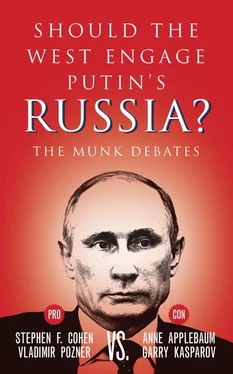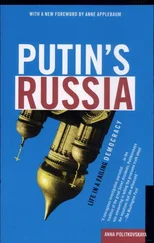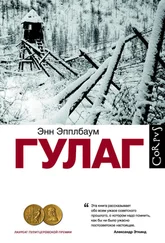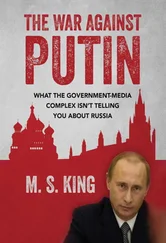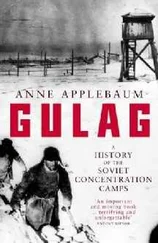And while it was ultimately the Soviet Union that broke the Nazis’ back — a fact confirmed by the likes of Winston Churchill and Franklin Delano Roosevelt — it is also true that the Soviet Union went on to occupy all the countries of eastern Europe as well as some of central Europe. It is also true that the country became a military superpower, and we should thank our lucky stars that World War III never happened, thanks to mutually assured destruction (MAD).
The U.S.S.R. did not fall apart because it was isolated, or because of non-engagement on the part of the West, which in fact made it stronger. The U.S.S.R. fell apart because the system ceased to function. It was simply not viable. And what was the West’s response when Gorbachev and then Yeltsin came to power? Did the West engage the new Russia?
If we look a little bit beyond the good old Gorby-era PR spiel that was spewed out by the West for popular consumption, the policy was essentially: You lost the Cold War and you’ll pay for it. Just shut up. Go back into your cave. You’re a second-rate country and we don’t care about you anymore.
Russia today would be a very different country had the West — the United States first and foremost — decided to engage Gorbachev’s Soviet Union and then Yeltsin’s Russia with the same aims with which it engaged post–World War II Germany and Italy, to help create and support democratic development and institutions.
In conclusion, the Russia that exists today is to a large extent the result of non-engagement by the West, of a policy aimed at humbling what is a nation of proud people. I vote for engagement because I want to see change in Russia, positive change both for Russia and for the West. Thank you.
RUDYARD GRIFFITHS: Anne Applebaum, you’re up next.
ANNE APPLEBAUM: Thank you, Rudyard, and thank you to this fantastic audience, but no thanks to whoever wrote the resolution that Garry Kasparov and I must oppose this evening. I, like the rest of you, believe very strongly that engagement is a positive thing. Engagement, integration, peace, and prosperity are all linked. Isolation, by contrast, sounds negative and confrontational.
I have been a long-time advocate for the integration of eastern Europe with the West, and initially I believed that engagement, which works so brilliantly in Poland, where I live, could work for Russia, too. Alas, I have concluded, after long experience, that for the moment it can’t — because this current Russian regime, as it now exists, cannot be engaged.
Putin’s Russia is not just another autocracy or traditional Russian dictatorship, as Stephen F. Cohen will probably tell you. Russia’s current leaders are not simply the political rulers of their nation. They are literally the country’s owners: they control all of its major companies, all of its media, and all of its natural wealth. During the 1990s they took over the Russian state, in league with organized crime, using theft, graft, and money laundering.
As a result, Russia is one of the most unequal countries in the world, with 110 Russians controlling 35 percent of the nation’s wealth. Many of those people also work in or with the Kremlin.
Whatever you want to call this system — a mafia state, a feudal empire — it’s a disaster for ordinary Russians, but it is also extremely dangerous for everybody else. In order to stay in power and to keep this tiny group of people enriched, Putin and his cronies have long needed not only to spread the system to their immediate neighbours but to undermine rule of law and democracy in the West as well.
How does this work? Putin and his henchmen badly need to keep the international financial system safe for corrupt money. To do so, they buy Western politicians. For example, when in power, former German chancellor Gerhard Schröder stopped an investigation into a financial scam closely connected to Putin. Schröder now works for Gazprom, the Russian energy company.
Putin’s cronies have also invested heavily in strategically important European companies, hoping that by doing so they’ll acquire the political influence they need to protect their dishonest schemes. They make ample use of tax havens, thereby enriching the providers of these corruption services and depriving legitimate governments of revenue. How do we stop this? Only by disengaging and isolating the problem. Let’s get Russian money out of the Western financial system.
A second example: Putin and his henchmen are often frustrated by Western multilateral institutions, such as the European Union (EU) and NATO. A united EU energy policy would make it much more difficult for Russia to use its gas pipelines the way it does now — to blackmail and bully its neighbours. If it weren’t for NATO, Russia would find it much easier, for example, to take the land that it badly wants in the Arctic. And so the Russian regime has invested heavily in anti-European, anti-transatlantic, and even fascist political movements all across Europe.
A Russian bank has lent nine million euros to Marine Le Pen, the leader of the far right in France. Russia also maintains strong political and financial links to the anti-Semitic Jobbik party in Hungary and to far-right groups in Germany, Italy, and many other countries. What to do about this problem? We need to disengage and we need to isolate. Let’s get Russian money out of European politics.
A third example: the Russian regime has invested massively in an enormous system of disinformation — television stations in multiple languages, web sites, fake think-tanks, a vast army of Internet trolls — whose work is now well documented, and which are designed to create chaos and confusion. This isn’t traditional propaganda. It’s not about saying that Russia is a great country.
When a Russian missile shot down a Malaysian plane over eastern Ukraine last summer, the Russian media responded with multiple absurd conspiracy theories, including that the plane was full of dead people when it took off. But even on an ordinary day, Russia Today, the Russian English-language TV station, has reported on the Central Intelligence Agency’s (CIA’s) invention of Ebola. The point of these stories is to create a fog of disinformation so that no one knows what is true and what is not anymore. How can we break through this fog and shore up our traditions of objective reporting? We have to disengage and isolate. Let’s work harder to identify Russian lies and get them out of our media.
You’ll note that I haven’t yet mentioned Ukraine, which is because I believe you can’t understand the recent crisis there until you understand the true nature of the current Russian regime. For two decades now, Russia has maintained control over Ukraine by investing in politicians, companies, and disinformation. Putin hoped to create a Ukraine with a copycat, colonial version of the political system he invented in Russia — and he almost succeeded. The young pro-European and pro-democracy Ukrainians, who protested on the streets in December 2013, were not fighting Russia as a nation. They were fighting oligarchs, corruption, and Putinism. How can we assist these young Ukrainians?
I repeat: we need to disengage and to isolate Putinist Russia. We need to maintain sanctions on Putin’s cronies, those 110 people around him who control their country. We need to make Putin pay a high price for invading a neighbour so that he doesn’t invade another one. And the best way to do this is to isolate Russian money, isolate Russian oligarchs, malign Russian political influence and propaganda, and prevent Russian violence and corruption from distorting the politics of Europe and North America. Putinism is a danger to Russians, to Ukrainians, and to all of us. Thank you very much.
RUDYARD GRIFFITHS: You finished with ten seconds on the clock, Anne. Impressive. Stephen, you’re up next.
Читать дальше
